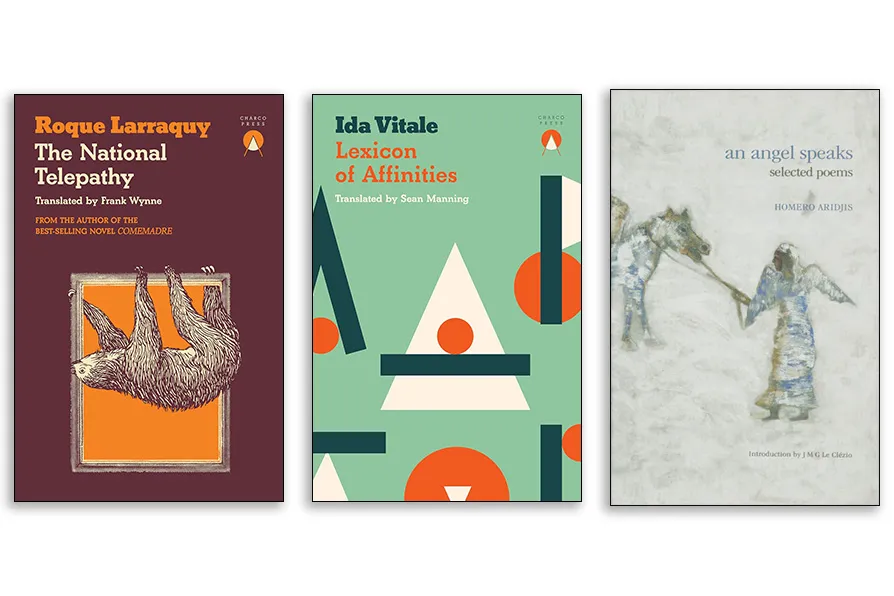SUE TURNER is fascinated by a book that researches who the largely immigrant workforce were that built the Empire State
A novel by Argentinian Jorge Consiglio, a personal dictionary by Uruguayan Ida Vitale, and poetry by Mexican Homero Aridjis


IN the early 1930s, the Peruvian Rubber Company sent a shipment of 19 Indigenous people from Iquitos, Peru, to Buenos Aires for Amado Dam, who was working on the construction of an Ethnographic Park in Tandil, in the province of Buenos Aires.
The group was to be put on show for the locals to enjoy the “exotic races.” To reduce costs and stop them from being “idle,” it is decided that the Indigenous people will finish the thematic park with their own hands.
This is how The National Telepathy (Charco Press, £11.99), a novel by Argentinian writer Roque Larraquy and translated by Frank Wynne, begins.
But as the group arrives in the Argentinian capital, there is a problem. The Indigenous people lack surnames and therefore cannot legally enter Argentina. Amado Dam has only 10 days to resolve the issue and takes the group to a flat in the upscale neighbourhood of Recoleta.
We also learn that the group is accompanied by a strange box containing a sloth, which, it transpires, can create erotic telepathic connections between people and make them feel and see extraordinary things.
“I find myself inside an alien memory, the ghostly silhouette of my adult frame in the body of a 10-year-old boy. The lobby of the Teatro Colon. The boy is climbing the stairs with his mother, a middle-class Italian schoolteacher. It is a childlike, Western memory. The information reaches me more quickly and in greater quantity than it did with the Indian. This is a world familiar to me, the experiment is not wasted on first impressions,” writes one of the protagonists of this intriguing story.
Larraquay employs irony and satire alongside fast-paced language to explore the colonial violence Indigenous communities face in Latin America. He writes about their appalling treatment and fetishisation while exploring the very notion of “civilisation.” The novel also provides a surreal critique of power dynamics, although it loses some strength towards the end, where the story of the telepathic sloth ends abruptly before an appendix of historical documents.
Nevertheless, it is a striking novel that deserves to find new readers in the English-speaking world.
Lexicon of Affinities (Charco Press, £11.99), by Uruguayan poet, translator, essayist and writer Ida Vitale, immediately caught my attention. Once I began reading, I couldn’t put it down. Skilfully translated by Sean Manning, the book reads like a very personal dictionary of words, concepts and ideas as wide-ranging as the vast landscape of a fascinating mind.
From the writer’s passion for classical music, painting and her native Montevideo, to the idiosyncratic family stories of her childhood in Uruguay, as well as her love of plants, flowers, books, libraries, writers and anecdotes, this book serves as a dictionary for seeing the world in unusual ways. There are entries in the form of surreal, expanding descriptions, poems, personal memories and historical recollections.
“Reading,” writes Vitale, is “a burning mirror where what we consume consumes us.” Concerning the artist Paul Klee, she observes: “To the tune of a mythical childhood, Klee’s color scale parts the torpor of twilight like a ship.”
Each definition represents an entire world, confirming Vitale, winner of the prestigious Cervantes Prize, as one of Latin America’s most original and thought-provoking writers.
Mexican writer Homero Aridjis, the author of 51 volumes of poetry, fiction, children’s stories, essays and plays, first visited London and the Swedenborg Society in 1967. That visit made a big impression on the poet’s mind, who, many decades later, decided to write poems about angels, their spiritual and metaphysical implications and the human fascination with them.
An Angel Speaks: Selected Poems (The Swedenborg Society, £8.95) includes a few of these poetic musings on angels, as well as some of the most celebrated poems by Aridjis.
Among my favourites is The Last Night Of The World, where the poet meets an angel, much like Swedenborg himself, “with big feet/ reading the paper under the muddied moon, the golden prints of his feet were embossed on the sidewalk,/ ANGELS INVADE THE CITY —/ was the news of the day;/ OUR VIRGINS LOVE-CRAZED BY ANGELS —/ yesterday’s./ Then, unwilling and unenthused,/ I unwalked all the roads,/ as if the love of the beings I knew/ had deserted the streets of the Earth./ Then, on reaching my home,/ like the angel at the window, I put/ my ear to hearing the water of the vanished river.”
A collection of poetry characterised by beautiful, dream-like imagery, clarity and emotional resonance.

A ghost story by Mexican Ave Barrera, a Surrealist poetry collection by Peruvian Cesar Moro, and a manifesto-poem on women’s labour and capitalist havoc by Peruvian Valeria Roman Marroquin

LEO BOIX introduces a bold novel by Mapuche writer Daniela Catrileo, a raw memoir from Cuban-Russian author Anna Lidia Vega Serova, and powerful poetry by Mexican Juana Adcock












